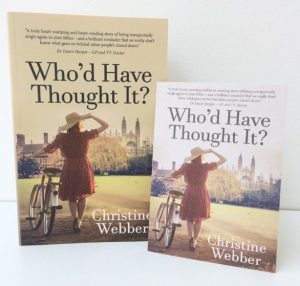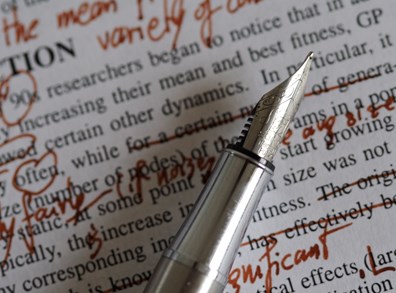We are very happy to introduce you to Helen Baggott, accredited editor and proofreader.
Helen works across a multitude of genres and offers an innovative read-as-you-go service for authors, indie or traditionally published.
After hearing nothing but positive things about her eagle-eyed service (from some of our authors and others) we decided we needed to know more …

How did you get into editing/proofreading full time?
Fifteen years ago I was a volunteer editor for a local magazine. I decided that a course would benefit the magazine and my own writing (short stories and articles). It wasn’t long after I completed the course that the self-publishing industry developed into the accessible platform we know today.
Why did you create your read-as-you-go service?
As the self-publishing market blossomed I recognised the need for affordable proofreading. Too many writers were publishing their books without having the content edited and proofread. My read-as-you-go service breaks the cost down into manageable payments and allows authors to budget the cost of having a professional work with them. There’s no commitment beyond each stage and there’s no time limit on when the author needs to submit their project for more work. As well as self-publishing clients I also work with traditionally published authors. Increasingly, they are expected to submit polished manuscripts and to fund the work.
Do you have a certain method or does it change manuscript to manuscript?
Every manuscript is different – every writer is different. By the end of the first chapter I have appreciated the style and have a good sense of the author’s voice. That voice is critical – any suggested changes must retain it. Also, I will make a note of any quirky styles – just to ensure that the author’s voice is consistent. It’s surprising how often an author will change a character’s style. If I don’t hear the character saying those words, I flag it up.
Why is the tradition for proofreaders to read the manuscript 3 times? Is 3 the magic number?
I’m not sure I’d term it ‘magic’ but multiple reads will always benefit the content. An author carries their book in their mind. The plot, the characters – it’s all stored away. As they work on a project it’s impossible for them to recall exactly what elements might have been added or removed. Cutting out one paragraph can impact on something else. Fresh eyes are critical – ensuring those changes don’t ruin the book. I don’t focus on set elements during the separate reads. Each read allows me to absorb all the details to a greater degree.
What would you say to those looking to skip the proofreading stage?
Do so at your peril! By the time a manuscript is finished an author can almost recite the content, that’s how familiar it becomes. Even the way the paragraphs break on a page will be imprinted and the brain and eye will conspire to deceive. It’s unlikely friends and family will criticise or find fault with the work – employing an impartial professional is essential.
What is the difference between editing and proofreading?
Editing will ultimately ensure a manuscript is structured and rounded, that it has no plot bumps and inconsistencies. It should ensure that the reader isn’t suddenly caught unawares by an unconvicting scene. Inexperienced authors will sometimes force something on to a character to suit a scene or a plot twist. That short-changes a reader’s experience. Characters have to be fully-formed and whilst you shouldn’t reveal everything on the first page, you do need to create a credible cast. We all, in real life, occasionally act out of character. But there’s a reason, an external influence. The skill of the author will create exactly that, and the editor will ensure it all has the mark of credibility, even in incredible scenarios.
Proofreading will correct typos – spelling, grammar, punctuation, etc. However, if I’m asked to proofread a manuscript and it’s clear it hasn’t been edited, I will include the relevant information in my report.
Some authors will openly ignore the grammar rules and advise me to leave it alone. Creating a style is all well and good but if a reader can’t comprehend the content, something needs changing. That’s particularly relevant with the ‘free excerpt’ available on Amazon. Potential readers have no patience – you get a moment to make that sale.
Editing and proofreading will also involve a certain amount of fact-checking. Whilst I don’t have access to an author’s research, I do check as many details as possible. It’s always better to query something than assume it’s correct – especially with non-fiction.
Having a good relationship with a client is essential. I am fully aware that they might have spent years on their project. Constructive criticism is all about supporting the author through the final months of the process – not bashing their dream to death. I want my clients to produce the best book they possibly can and to enjoy the process.
Before you receive a manuscript, what should the author have done?
Read it! Seriously, some authors are just too keen to pass the project on. It concerns me when I receive an email update from a pre-booked client advising that they have one more chapter to write and then it will be ready for a ‘quick check’ by me. No! It’s highly unlikely that a manuscript is viable after just the first draft.
As to how an author presents their manuscript, this varies from client to client. Some will submit a very polished document. Others might have little experience of working with Word and require help creating and formatting the document – setting indents etc. I can take a raw document and develop it into something that’s ready for the next stage – either to be self-published or passed to another professional for typesetting. Today, editors and proofreaders need to do more than correct errors. I prepare manuscripts for paperback and e-book formats. A lack of computer skills shouldn’t be the reason a writer can’t experience the thrill of seeing their work in print.
You are an ALLi member and recommended service. How does ALLi help authors?
ALLi supports self-publishing authors and aims to improve the quality of self-published books – and the perception of self-publishing in general. I share that passion – and have been vetted by the organisation as a partner member. It’s too easy to knock self-publishing authors and accuse them of vanity. That’s unfair – many self-publishing authors have been traditionally published and are now enjoying the freedom that self-publishing offers. ALLi recognises this and offers a wealth of advice, including guides and forums. The members are most generous with their support. Writing is often a very lonely profession and becoming a member of ALLi removes that sense of isolation.
What are the warning signs of a poor service? How can authors avoid bad editing services?
It’s difficult to assess the service from just an advert. If a writer is a member of a group, ask for recommendations. As an established professional most of my new clients find me via recommendations. ALLi produces a directory of approved service providers.
What is your top tip for Indie Authors when it comes to editing/proofreading?
I always think it’s a terrible shame that some authors do not allow time in their self-publishing schedule for editing and proofreading. Setting a date for their book’s launch seems more important than having a polished product. In five years’ time, postponing the launch by a month would be irrelevant. Bad reviews on Amazon (because of errors) will be there forever. My top tip would be: create a timetable that allows you to self-publish the best book you possibly can. Don’t compromise just because you have a date ringed on the calendar.
You can find Helen’s website by clicking here or at www.helenbaggott.co.uk.
